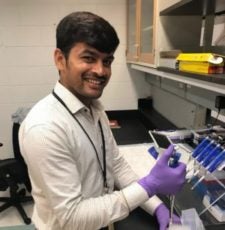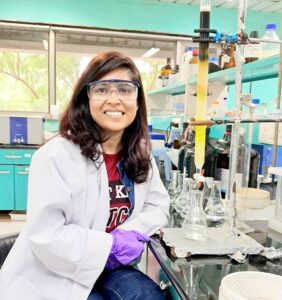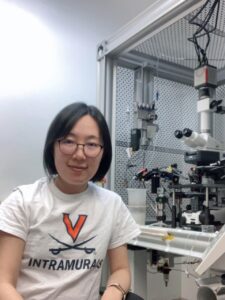Professional Research Staff
Serapio M. Baca, PhD
 Senior Research Scientist
Senior Research Scientist
Bayliss Lab, Pinn Hall 5013
email: serapio.baca@virginia.edu
phone: 434-982-4466
My research focuses on understanding the relationship, under various conditions, between respiratory centers in the brainstem that are chemosensitive (e.g., CO2 and pH) and those that are involved in driving inspiration and expiration. To understand these relationships requires a number of techniques including whole cell patch-clamp, nerve recordings, and optical imaging of populations of cells—neurons and glia—in reduced preparations. My approaches are complimented by a number of molecular approaches in the Bayliss lab that aim to uniquely identify the molecular components of the chemosensors and to identify cell-specific markers to better delineate the relevant cell networks present in the Retrotrapezoid nucleus (RTN) and other identified respiratory centers.
Laura Bell, PhD
Sara Dogom, MD
 Post-Doctoral Researcher
Post-Doctoral Researcher
Voss Lab, Pinn Hall, 5026
email: gyt7nm@uvahealth.org
Kelly Dunham, PhD
Post-Doctoral Researcher
Jefferson Scholars Foundation Fellow
Bland Lab, Pinn Hall, 5213
email: ked2du@virginia.edu
Kelly is a post-doctoral researcher in Dr. Michelle Bland’s Lab. She started in November 2023 after receiving her PhD in May 2023 in Dr. Jill Venton’s lab in UVA Chemistry. Since 2022, she has been a Jefferson Scholars Foundation fellow in the College of Arts & Sciences and currently teaches courses in their Engagements Program. Her thesis work focused on measuring serotonin changes in fruit fly brain tissue to understand differences with common antidepressants for depression disorders. Her work in the Bland lab focuses on measuring Drosophila insulin-like peptide changes to diet and infection to understand fundamental molecular changes with metabolism and diabetes.
Ronald Gaykema, PhD
 Research Scientist
Research Scientist
Perez-Reyes Lab, Pinn Hall, 5056
email: gaykema@virginia.edu
Ron is a neuroscientist with a past and present research focus on basal forebrain-cortical connectivity, immune-brain interactions (neurocircuitries impacted by infection and immune activation), and mechanisms of seizure disorders, and testing novel gene therapies.
Scott Kilianski PhD
 Postdoctoral Fellow
Postdoctoral Fellow
Beenhakker Lab, Pinn Hall, 5058
email: twt4uk@virginia.edu
phone: 973-900-1222
My current work aims to answer two questions: 1) how is the extraordinary neural synchrony initiated and rapidly broadcast across the entire cortex during an absence seizure? 2) How does energy metabolism alter neuronal excitability and ultimately change network-level activity to become more or less prone to seizure? To answer both of these questions, I use various types of genetically modified mice that allow me to finely dissect the contributions of energy metabolism signaling pathways and different brain structures that are involved in generating absence seizures.
Dániel Kucsera, PhD

Postdoctoral Research Associate
Leitinger Lab, Pinn Hall, 5036
email: fpp4bs@virginia.edu
phone: 434-257-5921
My research focuses on cardiometabolic inflammation.
Mohan C Manjegowda, PhD
 Senior Scientist
Senior Scientist
Desai Lab, Pinn Hall, 5017
email: mcm3ha@virginia.edu
phone: 434-243-1920
I hail from the foothills of the Western Ghats, India. Completed my bachelor’s degree in biotechnology from Visvesvaraya Technological University and Ph.D. from Dept. of Biosciences and Bioengineering, Indian Institute of Technology Guwahati, India. My doctoral research was focused on understanding the expression regulation and significance of G-protein coupled estrogen receptor (GPER1) in breast cancer. My research interests are epigenetics, chromatin dynamics, and gene expression regulation.
The focus of my postdoctoral research is to understand the onset and development of fatty liver disease (hepatic steatosis). Excessive accumulation of fat in the hepatocytes is a characteristic feature of hepatic steatosis. The pathological condition is also associated with the wrinkled nuclear lamina and abnormal nuclear morphology. I am studying the significance of this wrinkled nuclear lamina on chromatin dynamics and gene expression regulation. Using a gene-therapy approach, I am exploring the possibilities of reverting the wrinkles of the nuclear lamina to develop a treatment strategy. Next-generation sequencing techniques such as ChIP-Seq, Hi-C, and RNA-Seq are some of the high-end techniques I use for my investigation.
Priyanka Rawat, PhD
 Post-Doctoral Research Associate
Post-Doctoral Research Associate
Leitinger Lab, Pinn Hall, 5036
email: hcu2sk@virginia.edu
phone: 434-409-8531
I completed my Ph.D. degree in Analytical Chemistry from CSIR-Central Drug Research Institute, India. My research was focused on Mass Spectrometry (MS)-based identification and structural characterization as well as quantification of small molecules and the discovery of pharmaceutically active fractions and compounds from plants. Currently, I am particularly interested in how tissue damage is translated into chronic inflammation and tissue fibrosis, and how oxidized phospholipids and other danger signals contribute to these processes. I am using MS to identify and characterize novel danger-associated molecules that can be used as biomarkers of disease progression and I measure levels of oxidized phospholipids in murine models as well as in human plasma samples. In addition to this, I am also aiming to develop MS -based methods for isotope tracing and metabolomics.
Huihui Ren, PhD
 Postdoctoral Research Associate
Postdoctoral Research Associate
Sun Lab, Snyder Building, 220-1
email: jvs4rg@virginia.edu
My research focuses on the role of endoplasmic reticulum (ER) protein folding and degradation in the pathogenesis of cardiometabolic disease.
Ram Prasad Sahu, PhD
Zhenfeng Song, PhD
 Post-Doctoral Research Associate
Post-Doctoral Research Associate
Sun Lab, Snyder Building, 220
email: zfr5qe@virginia.edu
phone: 313-804-6021
My research focuses on the role of endoplasmic reticulum (ER) protein folding and degradation in the pathogenesis of various liver diseases such as hepatic conformational diseases, liver cancer, non-alcoholic fatty liver disease, and liver cirrhosis.
Haixia Wang, PhD
 Postdoctoral Researcher
Postdoctoral Researcher
Sun Lab, Snyder Building 220-1
email: nyy6qs@virginia.edu
phone: 945-208-7063
I will conduct research related to ERAD mechanism
Quanwei Wei, PhD
 Research Scientist
Research Scientist
Sun Lab, Snyder Building 220-1
email: hmg8pr@virginia.edu
phone: 434-320-6553
My research focuses on the molecular processes of endoplasmic reticulum-associated degradation (ERAD) in the context of protein misfolding diseases, specifically examining its impact on smooth muscle systems and the role of ERAD during the process of spermatogenesis. We aim to explore how ERAD regulates intracellular protein quality control mechanisms and analyze its critical role in smooth muscle cell function and germline cell development. Through this study, we hope to uncover the significance of ERAD in both physiological and pathological states, providing new insights into related diseases.
Yajun Zhang, PhD
 Research Scientist
Research Scientist
Beenhakker Lab, Pinn Hall, 5025
email: yz6k@virginia.edu
phone: 434-227-3282
My research interest lies in the regulation of synaptic transmission in the nervous system, with a particular focus on developing new tools for brain science research. I have contributed to the development of genetically encoded sensors for the detection of neurotransmitters. Using the sensors for high-resolution fluorescence imaging could provide a deeper understanding of the complexity of the nervous system in both space and time. Ultimately, I aim to use these tools to study the regulation of presynaptic transmitter release in studying the fundamental mechanisms for psychiatric disorders and neurodegenerative diseases.



 Post-Doctoral Research Associate
Post-Doctoral Research Associate